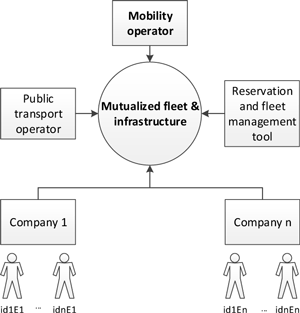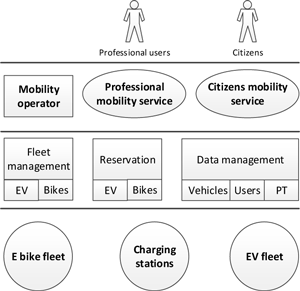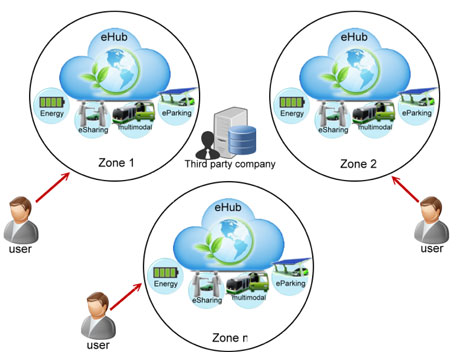by Marie-Laure Watrinet, Gérald Arnould, Hedi Ayed and Djamel Khadraoui
Integrating public transport systems with individual car-and-ride sharing concepts is considered as an attractive, convenient and emissions reducing mobility concept in the frame of Smart Cities. The pooling of mobility services is considered to be an important enabler of the Smart Cities’ concept, especially with regards to achieving flexibility and integration with existing transport modes (mostly public transport). Even if the levels of user acceptance towards new smart sustainability concepts are still challenging their uptake, it is important to address ICT-related challenges to ensure adaptive solutions are found to reduce complexities. This is especially relevant in the case of electro-mobility related systems.
Tudor, via its mobility projects, has developed a concept for sharing electric vehicles (EVs) and cross-company optimization solutions. This concept aims to increase sustainable resource productivity by sharing EVs across various companies or organizations. This approach is likely to increase the overall usage of each vehicle but reduce costs per kilometre and users. During the work-day the vehicles are used for professional activities, but for the rest of the time, they become a collective resource that can be placed in carpooling mode.


Such a combined usage presents significant algorithmic complexity and solving this so that an e-fleet can be used for public and professional purposes is challenging, The actual concept was evaluated via simulations of different scenarios using MATSIM, A multi-agent approach was considered, where each agent represented a traveler. A previous national project, Moebius [1,2], provided the simulation data. The main objectives were to validate the concept of combined car-sharing and car-pooling from the perspective of resource optimization and find strategic charging locations [3].
The EV sharing service concept presents users with a hop-on, hop-off system that has demand responsive fleet management (which includes predictions of what locations are going to have the highest user needs). The system’s resources (e.g., EVs, e-bikes and associated infrastructures) are mutualized along with an information system, the service and, in future, public transport services.

The goal of the mutualisation concept is to maximize the use of vehicles across the day (both work and recreational times) but decrease the residual cost of the EVs. This can be achieved with an optimization algorithm [1] that can minimize the required number of vehicles at all times, based on planned usage (determined using statistics and simulation tools), real-time demand, and third party companies that can manage the fleets (by zones) with new business models. EV sharing can also be associated with other transport means such as car-pooling and public transport.
The experimentations
Two real experimentations (via two European Regional Development Fund (ERDF) projects called ZAC-eMovin and Nordstad-eMovin) have been deployed under the actual concept. The first project is on the professional use of shared EV fleets and infrastructure between companies. The second focuses on the citizen oriented integration of several types of e-mobility services. In both projects, a coherent approach is considered, including the use of public transportation systems and the identification and integration of the required IT services. Each project provide recommendations on the best way to integrate e-mobility services, based on in-depth analyses of relevant systems and user behaviours.
In the ZAC-eMovin project, employees of the three project partners are using the EV in their company’s fleet for day-to-day professional travel as well as travels between home and work (and visa versa). The goal of the project is to mutualize the resources, EV and charging infrastructure in an activity zone between the companies.
The fleet management service relies on a resource allocation algorithm which take the limited range of EVs and their charging periods into account, following which it optimizes the EV. The service proposes public transport trips instead of EV leases where possible, and allows for resources to be shared across the participants which guaranteeing safe data exchange and privacy.
The Nordstad-eMovin project is considering the shared usage of EVs and e-bike in Nordstad (Luxembourg) from the citizen’s perspective. This project is also considering the integration of public transport systems. Citizens can use any of the three services offered by the system in an integrated way: EV short-time renting, e-bike renting or private vehicle charging. E-bikes are preferred for short-distance travel or when there are heavy traffic conditions. EVs can be used to go shopping, or for longer-distance travel, depending on the requirements of the user. A typical usage could cover the last mile of travel from the train station to work or home. Resources will be mutualized to allow for both the professional and private use of the services.
Links:
http://www.nordstad-emovin.lu
http://www.zac-emovin.lu
References:
[1] H. Ayed, D.Khadraoui: “Local Search Algorithm for the Daily Car Pooling Problem”, International Conference on Metaheuristics and Nature Inspired Computing 2014
[2] H. Ayed, B. Gateau, D. Khadraoui: “Simulating daily mobility in Luxembourg using multi-agenda based system”, 28th European Conference on Modelling and Simulation 2014.
[3] G. Arnould, et al.: “Modelling and simulating a dynamic carpooling system for improving citizens mobility”, International Journal on Space-Based and Situated Computing, Vol 1, 2013.
Please contact:
Marie-Laure Watrinet, Gérald Arnould, Hedi Ayed, Djamel Khadraoui
CRP Henri Tudor, Luxembourg
E-mail:











